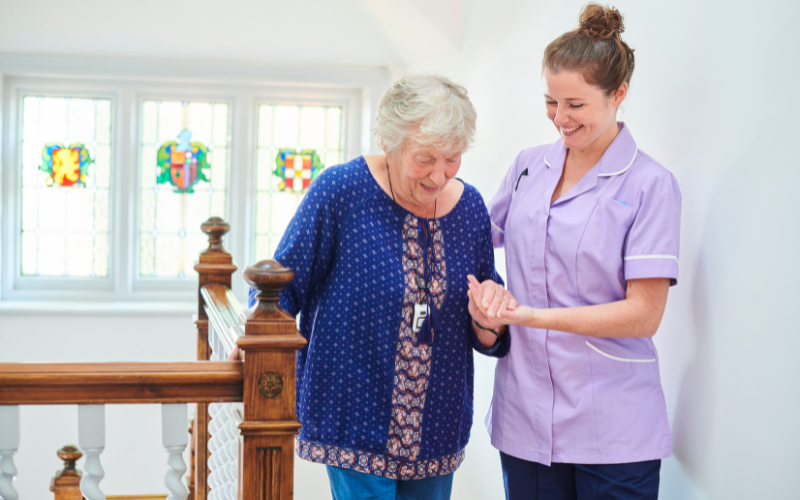
Fostering independence in seniors with dementia is crucial for enhancing their sense of self-esteem. Patients with Alzheimer’s who become too dependent on their caregivers often engage less in daily self-care tasks, which diminishes their autonomy. When caregivers overlook the importance of encouraging independence, they may offer unnecessary assistance. It’s important to recognize that, particularly in the early stages of dementia, the elderly can manage many daily tasks independently.
Seniors living with dementia exhibit a range of abilities, underscoring the importance of caregivers closely monitoring their memory care recipients to accurately identify areas requiring assistance. Promoting self-care practices, where feasible, can significantly mitigate feelings of dependency and discouragement in dementia patients.
Caregivers offer invaluable support by empowering senior care recipients to engage in simple tasks independently. Furthermore, deconstructing complex tasks into smaller, more manageable activities fosters a sense of autonomy among the elderly. You can help enhance their self-sufficiency through the following methods:
1. Establish Routines
Seniors suffering from dementia thrive in routine. Regular schedules for meals, bathing, and sleeping give the elderly feelings of security and reduce anxiety. Routines are also known to be excellent memory prompts. When a senior knows what to expect and when, the routines serve as reliable memory aids.
2. Write Out Schedules
Writing down appointments, mealtimes, and activities helps seniors with dementia know what to expect. Notes may be made onto large wall calendars or bulletin boards so that seniors will not miss them. Alternately, the senior may elect to keep a diary or small notepad to help jog their memory.
If the senior with dementia has access to technology, text alerts and notes on the senior’s phone will help them remember to accomplish the necessary tasks. A text alert may sound to notify the senior to take a certain medication or remind them to attend a social function.
3. Give Positive Encouragement
It is common for those caring for dementia patients to focus on their limitations, including what they cannot do or what may be too much for them to handle. This creates a negative feeling in dementia patients that discourages them from being more independent.
Instead of focusing on what your loved ones cannot do, emphasize their strengths and abilities while encouraging them to handle tasks and other things that they can do. Make sure to do this for all activities including exercise, cooking, self-care, chores, and social activities. Encouraging them to stay within their strengths and abilities in these situations will give them the confidence to exercise more independence.
4. Promote Exercise
Daily bouts of physical activity help the senior with dementia build muscle strength and increase flexibility. As part of the established routine, for instance, a caregiver may arrive at nine o’clock each morning to accompany the senior on a leisurely stroll around the park.
Seniors who engage in regular physical exercise develop the bodily strength to continue participating in the activities of daily living for an extended duration. Exercises may be simple, such as light stretching, senior yoga, or short walks around the home or neighborhood.
5. Invite Kitchen Help
An elderly individual may no longer have the capability to prepare a full meal. Rather than overtake the kitchen, invite the senior to help with the food preparation. The senior may wash vegetables, fold dinner napkins, set the table, or remove cooled cookies from a baking tray.
6. Request Household Help
Similar to asking the senior with dementia to help in the kitchen, caregivers may encourage independence by assigning small household chores. The elderly individual may be given the responsibility of watering houseplants, for instance; or post-meal cleanup may be a fitting duty.
7. Opt for Easy-to-Wear Clothing
Dementia causes the senior to lose the ability to independently handle minor tasks, like dressing. Promote independence by changing gear. When the senior struggles to tie shoelaces, purchase a pair of Velcro shoes. Slacks with elastic waistbands are easier for seniors to slip on, so toss out the belt buckles.
8. Utilize Labels and Signs
Seniors with dementia may have trouble recalling tasks. Help these individuals by making use of labels. Adhere labels to the medicine cabinet so seniors know where to put medication bottles and which pills to take. Place signs on the door to remind them to lock the front door each evening.
9. Engage in Social Activities
Being in the company of others is crucial for seniors living with dementia, as the disease can lead to isolative tendencies. Staying socially engaged gives these individuals a sense of meaning and purpose. Choose social activities that match the seniors’ ability levels and preferences.
Boosting a senior’s feelings of inclusion may be accomplished through various appropriate activities, such as singalongs, dancing, arts and crafts, and music. Rather than aim for the senior to acquire new skills, the focus should be on maintaining the senior’s existing skills set.
10. Consider Changing Abilities
Capabilities may fluctuate from day to day in seniors living with dementia. Elderly individuals are more able to handle certain tasks with more skill on some days than on other days. When the senior has difficulty with a particular task, allow the individual to try again another day.
When caregivers respect seniors’ changing ability levels, the older individuals are less likely to be overcome with feelings of frustration. Plus, when attentive caregivers are flexible and modify their initial approach, they significantly help senior care recipients maximize their independence.
11. Modify the Home
Small additions to the home environment help the senior with dementia stay on track. When placed in every room, large clocks with date displays can trigger memories of scheduled events and activities. Seniors’ orientation also increases when they are constantly reminded of the day, date, and time.
12. Have Patience
Dementia patients may be slow to handle certain tasks and have a difficult time retaining information. When caring for dementia patients and encouraging them to be more independent, it is important to be patient and give them the time and encouragement they need to feel comfortable and confident enough to complete tasks.
It is common for dementia patients to become agitated or upset as they encounter their limitations and losing patience with them will only make this worse. Always show patience and compassion towards seniors with dementia to encourage them to be more independent.
Dementia Care from Assisting Hands

The cognitive impairments associated with dementia, including challenges with memory, problem-solving, and other mental functions, can often be effectively managed through minor lifestyle adjustments coupled with consistent, compassionate support. Senior home care providers from Assisting Hands Home Care play a crucial role in supporting seniors living with dementia. These dedicated caregivers and companions are specially trained to handle the unique needs of those facing cognitive challenges, providing not just assistance with daily tasks but also offering emotional support and a sense of security, thereby improving the quality of life for both the individuals in their care and their families.
Our experienced caregivers are dedicated to ensuring that your elderly loved one receives the appropriate level of support to maintain an independent lifestyle. We prioritize encouraging physical activity by joining them for walks or providing transportation to senior yoga classes, fostering mental engagement through games and engaging conversations, and offering assistance with all daily living activities, such as bathing, grooming, and meal preparation.
Families in Medinah, IL | Glendale Heights, IL | Itasca, IL | Bensenville, IL | Elmhurst, IL | Villa Park, IL | Addison, IL | Lombard, IL, and surrounding areas in DuPage County, Illinois, continually trust Assisting Hands Home Care to provide dedicated dementia care services. We are committed to helping older individuals live comfortably, safely, and independently in the familiar setting of home. Call Assisting Hands at (630) 526-6522 to schedule your free in-home consultation.















